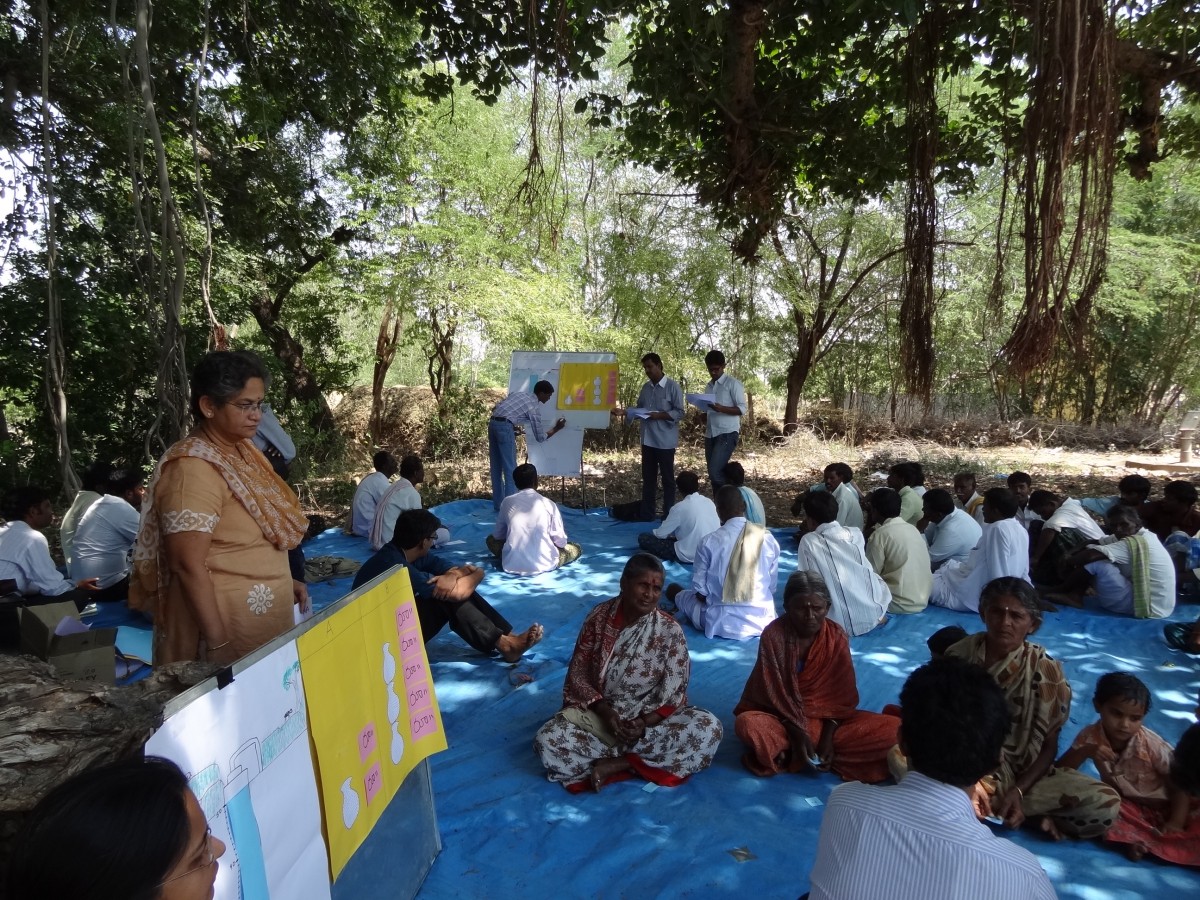In many parts of India, groundwater has fueled an agricultural revolution, creating opportunities for increased production and dry season cropping – enhancing food security and supporting agricultural and economic development. It has also created huge concerns regarding the sustainability of the resource and associated livelihoods. Studies suggest that parts of the Upper Ganges could be depleted by 2050.
As Ruth Meinzen-Dick from IFPRI explains: “Groundwater has proven difficult to devise common use rules for effective management. It’s hard to get people to manage something that they cannot see!”
This concern is emblematic of what is happening globally. Groundwater supplies around 40% of all irrigated areas globally. However, the combination of cheap pumping technology, energy and other subsidies, and poor governance of groundwater resources has contributed to groundwater depletion, threatening future food security and rural livelihoods.
At the recent Global Forum on Food and Agriculture held in Berlin, Germany, WLE partners and OECD organized a session titled “Agriculture and Groundwater: Feeding Billions from the Ground Up” to emphasize the increasingly critical link between groundwater and global food security. The session explored the global status and trends of groundwater use in agriculture and identified policies, institutions and technologies that could address the growing challenges surrounding agricultural groundwater use with a focus on key groundwater users China and India, selected countries in OECD and emerging users in Sub-Saharan Africa.

Global use, local solutions
In several regions of the world such as Sub-Saharan Africa and Southeast Asia, groundwater seems to present a great potential for increasing agricultural productivity and contributing to food security. Yet, as seen in other regions and countries like India, China, the Middle East, and parts of the US and Europe, this has also led to long-term depletion and other environmental challenges. How can we make sure that new groundwater irrigation development does not always lead to depletion and degradation – and how can we ensure continuous benefits and food security from groundwater in already stressed regions?
There seems to be a discrepancy between the availability of relevant data and information on agricultural groundwater irrigation and its impacts. While it seems that there are increasingly sophisticated efforts to monitor groundwater use in agriculture, farmers still have to see the benefit of disclosing information on their use and joint management for the common good.
Management lags behind development
The development and use of groundwater in agriculture appears to be largely associated with the availability of technological solutions and development-friendly policies. Indeed, these solutions may also have contributed to rapid depletion in some of the hotspot groundwater depleting regions. Only once economies are locked up with groundwater use and negative impacts emerge does the need for management become apparent. However, vested interests and prosperous economies make it difficult to turn the tide.
Much of the discussion focused on the pivotal role of solar pump technologies that could be highly beneficial in regions with ample groundwater resources, underdeveloped irrigation, and no electricity access. Still, it could also lead to further depletion in regions already critically water stressed. Some hope is attached to pilot programs in India where farmers are encouraged to sell their solar power to the electricity grid, and in the process curtail groundwater abstraction and reduce carbon footprints.
Dr. Guillaume Gruere from OECD recommended a tripod approach: simultaneously identifying entitlements and incentives, economic instruments and collective management. In China, on the other hand, Professor Jinxia Wang from Peking University suggested to outscale existing experiments with groundwater pricing and stressed the need to increase water efficiency and control water pollution. Further suggestions focused on strengthening knowledge and changing behavior toward stronger collective management of the resource.

The Joker in the deck – groundwater quality
One issue that emerged and needs more discussion is that of groundwater quality. Dr. Karen Villholth, Principal Researcher from IWMI, called water quality the ‘joker’ in the groundwater deck of cards. Irrigated agriculture can contribute to lasting deterioration of groundwater quality, preventing its use for drinking and endangering ecosystems and bio-diversity. Highly profitable agriculture comes with a cost, unless best management practices are carefully adhered to and enforced – something that still needs to be recognised in the policy debate.
Claudia Ringler, WLE Flagship leader on Managing Variability commented, “it is clear that a lot more work needs to be done to explain to governments how un-savory it is to over-exploit and degrade groundwater resources, as it affects its buffer function and can have high health, energy and environmental costs—these need to be better costed. That said, carefully monitored groundwater development needs to be further promoted, always jointly with accompanying institutions for sustainable management.”
Panelists concluded that further efforts should be made to discuss groundwater issues in national and international water-food-energy policy circles. Ministers of Agriculture at the Berlin Agriculture Ministers’ Conference at the Global Forum and the ensuing G-20 meeting fully recognized the need to move towards more sustainable agricultural water management, marking a useful first step that should now be followed with detailed advocacy, action and implementation plans for more sustainable groundwater use.
Feeding people from the ground up will not just require better information, rules and policies. It will also require changes in our mental models of how we view groundwater - not as a magical source of free water from the ground, but rather a finite and precious resource that needs to be collectively and effectively managed.







Comments
I cannot not to agreed more to the discussion of the above topic. It was some four to five decades ago, it can vividly embedded in my grey matter, that water from underground is so important to livelihood and the cleanliness of it.
My parents made sure that water drilled from the said pond from the mountain spring is free from agricultural activity on that side of the mountain.
The knowledge from CGIAR came to my sight gave me more insights on Global crisis of water and its conservation. With the full grown from the village, we understand that water is soooo important to every living things.
(My always advice to my community is build a special pipe from the kitchen to drain used water to the yard that grows lots of vegetables or plants and let such pipe be divided into canals form to give those plants moisture n growth and indirectly conserve water. Rainfalls be it big or small are collectively collected in tanks for use. Though in S.E Asia there may be growth of mosquitoes, thus they have to use sea rock salt. All gardens to be conserve water is from heaven free to place many pails to collect and water those plants.)